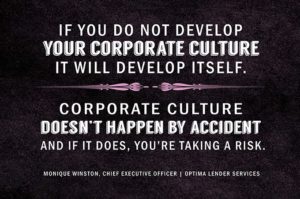What kind of a culture have you developed and encouraged at your company? Sadly, few business owners even give it a thought. If you don’t spend the time developing and nurturing the type of atmosphere and culture you think will make your business successful, then it will develop all on its own and you may not like the results and ramifications.
Your company’s culture is not something you will get to in the future. Your company’s culture is the future. If you don’t get that right, then, quite literally, nothing else matters. Recently, Chicago’s formidable Northwestern University took a look at how company culture affects the very life force of a company and how its creation and cultivation can make or break any enterprise. Below are the key findings of the report and come directly from the research:
A set of organizational surveys was designed to focus on linking
internal performance strategies to market and financial outcomes.
In particular, our goal is to understand the organizational
characteristics that best engender the necessary employee attitudes
and behaviors to drive an organization’s market and financial success.
Focusing on non-customer contact employees, the study sought to
understand the organizational drivers of employee satisfaction and
employee engagement (the degree of employee motivation and
sense of inspiration, personal involvement, and supportiveness), and
the downstream effects of these employee attitudes on customers
and financial performance. Data was obtained from a stratified
random sample of 100 organizations in the U.S. media industry.
- There is a direct link between employee satisfaction and customer satisfaction, and between customer satisfaction and improved financial performance.
• The key organizational characteristic for explaining employee satisfaction is organizational communication (a measure of the downward and upward communication in an organization).
• Employee satisfaction is a key antecedent to employee engagement.
– Interaction between managers and employees with regards to supportiveness and goal setting, as well as job
design were also key drivers of employee engagement.
• Organizational culture was another significant driver of employee engagement, where employees must be expected to cooperate and work together, but also to take charge and provide a voice for the customer within the organization.
– A fully cooperative culture feels the need to reach consensus on a single option, where a culture promoting
healthy competition provides multiple choices which are then balanced against one another in an attempt to
develop an optimal solution.
• When individuals and teams are competing to implement the optimal behaviors oriented to the market and its customers, such competition can work to the advantage of both the organization and its customers.
• Organizations with engaged employees have customers who use their products more, and increased customer usage leads to higher levels of customer satisfaction.
• It is an organization’s employees who influence the behavior and attitudes of customers, and it is customers who drive an organization’s profitability through the purchase and use of its
products.
• In the end, customers who are more satisfied with an organization’s products are less expensive to serve, use the product more, and, hence, are more profitable customers.
-Written by Kevin Sawyer



